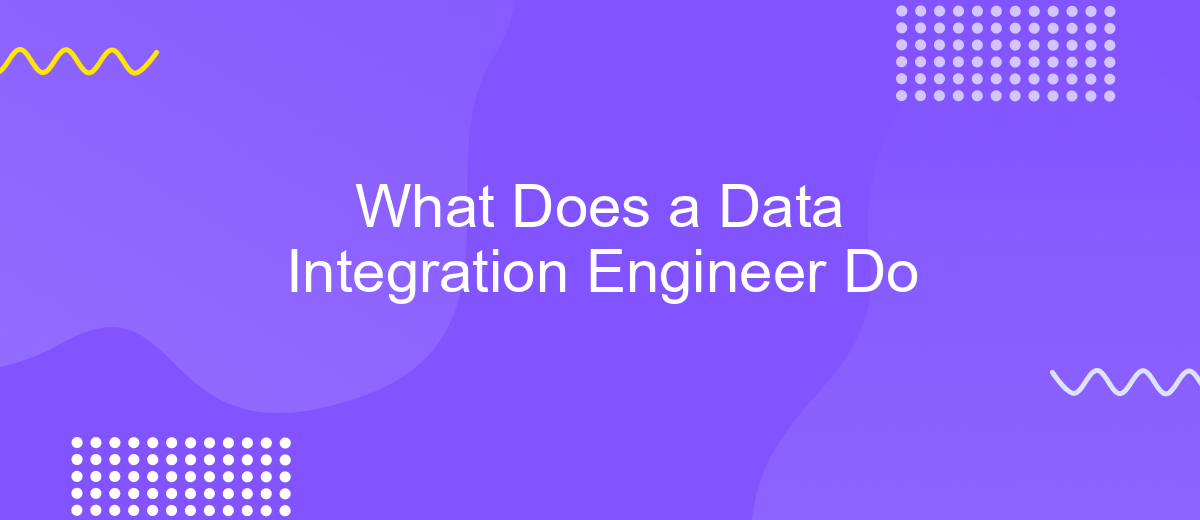What Does a Data Integration Engineer Do
A Data Integration Engineer plays a crucial role in today's data-driven world, ensuring seamless data flow between diverse systems and applications. They design, implement, and manage data integration solutions, enabling organizations to harness the full potential of their data. By bridging gaps between disparate data sources, these professionals facilitate informed decision-making and drive operational efficiency.
Introduction
In today's data-driven world, the role of a Data Integration Engineer has become increasingly vital. These professionals are responsible for ensuring that data from various sources is seamlessly integrated into a unified system, allowing organizations to make informed decisions based on comprehensive data insights. By bridging the gap between disparate data systems, Data Integration Engineers play a crucial role in optimizing business operations and enhancing data accessibility.
- Designing and implementing data integration solutions.
- Ensuring data quality and consistency across systems.
- Collaborating with data scientists, analysts, and IT teams.
- Monitoring and maintaining data pipelines for performance.
- Troubleshooting and resolving data integration issues.
Data Integration Engineers must possess a strong understanding of various data integration tools and technologies, as well as excellent problem-solving skills. Their expertise not only helps in consolidating data but also in maintaining its integrity and security. As businesses continue to rely heavily on data, the demand for skilled Data Integration Engineers is expected to grow, making it a promising career path for those with a passion for data and technology.
Responsibilities

A Data Integration Engineer is responsible for designing, implementing, and managing data integration solutions that enable seamless data flow between various systems and applications. They work closely with stakeholders to understand their data requirements and develop strategies to integrate disparate data sources. This involves creating data pipelines, performing data transformations, and ensuring data quality and consistency. Additionally, they monitor and troubleshoot data integration processes to resolve any issues that may arise, ensuring continuous and efficient data operations.
Moreover, Data Integration Engineers often leverage tools and platforms such as ApiX-Drive to automate and streamline the integration process. ApiX-Drive allows for the easy configuration of data integrations, enabling engineers to connect different applications without extensive coding. By utilizing such services, they can focus on optimizing and maintaining the integration workflows, ensuring that data is accurately and reliably transferred between systems. This not only enhances operational efficiency but also provides stakeholders with timely and actionable insights derived from integrated data sources.
Skills and Qualifications

A Data Integration Engineer plays a crucial role in ensuring seamless data flow across various systems and platforms. To excel in this field, a combination of technical expertise, analytical skills, and effective communication is essential. The following skills and qualifications are vital for a successful Data Integration Engineer:
- Technical Proficiency: Strong knowledge of ETL (Extract, Transform, Load) processes, SQL, and data warehousing.
- Programming Skills: Proficiency in programming languages such as Python, Java, or Scala.
- Data Modeling: Experience in designing and implementing data models and schemas.
- Tools and Technologies: Familiarity with data integration tools like Apache Nifi, Talend, or Informatica.
- Problem-Solving: Strong analytical skills to troubleshoot and resolve data-related issues.
- Communication: Ability to communicate complex technical concepts to non-technical stakeholders.
- Project Management: Experience in managing data integration projects, including timelines and deliverables.
In addition to the above skills, a Data Integration Engineer should be adaptable and continuously seek to update their knowledge with the latest industry trends and tools. A relevant degree in Computer Science, Information Technology, or a related field is often required, along with practical experience in data integration projects.
Career Path

A career path for a Data Integration Engineer typically begins with a strong foundation in computer science, data management, and software engineering. Many professionals enter the field with a bachelor's degree in computer science, information technology, or a related discipline. Gaining experience with data integration tools and techniques is crucial for advancing in this career.
As they progress, Data Integration Engineers often take on more complex projects and responsibilities. They may start by working as junior data engineers or analysts, gradually moving up to senior roles. Continuous learning and professional development are essential, as the field is constantly evolving with new technologies and methodologies.
- Junior Data Integration Engineer
- Data Integration Specialist
- Senior Data Integration Engineer
- Data Integration Architect
- Data Integration Manager
Reaching higher-level positions often requires a combination of technical expertise, project management skills, and leadership abilities. Certifications in relevant technologies and methodologies can also enhance career prospects. Ultimately, a successful Data Integration Engineer combines technical skills with strategic thinking to effectively manage and integrate data across various systems.
- Automate the work of an online store or landing
- Empower through integration
- Don't spend money on programmers and integrators
- Save time by automating routine tasks
Conclusion
In conclusion, a Data Integration Engineer plays a critical role in ensuring seamless data flow between various systems and platforms. Their expertise in designing, implementing, and managing integration solutions is essential for organizations to leverage data effectively. By employing advanced tools and technologies, these engineers enable businesses to make data-driven decisions, optimize operations, and enhance overall efficiency.
Additionally, services like ApiX-Drive can greatly simplify the integration process. ApiX-Drive offers a user-friendly platform that allows for easy setup and management of data integrations without extensive coding knowledge. This not only speeds up the integration process but also reduces the potential for errors, making it an invaluable tool for Data Integration Engineers. Ultimately, the role of a Data Integration Engineer is indispensable in today's data-centric world, ensuring that data is accessible, accurate, and actionable across all business functions.
FAQ
What does a Data Integration Engineer do?
What skills are essential for a Data Integration Engineer?
What tools do Data Integration Engineers typically use?
What industries employ Data Integration Engineers?
How does a Data Integration Engineer ensure data quality?
Time is the most valuable resource for business today. Almost half of it is wasted on routine tasks. Your employees are constantly forced to perform monotonous tasks that are difficult to classify as important and specialized. You can leave everything as it is by hiring additional employees, or you can automate most of the business processes using the ApiX-Drive online connector to get rid of unnecessary time and money expenses once and for all. The choice is yours!


